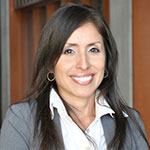From Ancient Greece to MEM
A new class in Northwestern's Master of Engineering Management (MEM) program focuses on creating modern-day business leaders who can navigate an age-old problem: Change.
Greek philosopher Heraclitus said that no one can step in the same river twice — the river, and the person, are always changing. Janice Mejia's modern-day mission is to create business leaders confident in their ability to manage through ever-present change.
Mejia will be teaching a new course in Northwestern's Master of Engineering Management (MEM) program called Business Process Change Management. The concept of change management has become a buzzword in businesses the past few decades, but it's a challenge that's existed since the world's earliest societies.

“While technology can assist in change management, it is not the solution to problems,” said Mejia, who is new to the MEM program but has taught at Northwestern since 2013. “Businesses need to understand how their processes are designed to produce outcomes.”
Helping students learn how to create that alignment will be a central part of Mejia’s class. She said it will take a holistic view of business needs — what she calls a “systems approach” — to highlight the variety of ways effective managers can lead businesses through change.
“A systems-thinking approach is considering the bigger picture to understand how people, processes and technologies work together in organizations,” she said. “It focuses on understanding how various factors within a system may produce different outcomes.”
Since the only constant in the world is change, Mejia will show her students that changing variables at different points along a process can create a multitude of different outcomes. Understanding those possible outcomes in advance and selecting the right variables to change are among the most vital things students can learn from her class, she said.
To help students get there, Mejia will present a variety of toolsets companies use to map and improve business processes, as well as the main drivers of successful change management. Students will be pushed out of a classroom setting and into the business world to implement what they are learning live.
“The coursework includes a team project, where students work with real companies or not-for-profits to map and improve real business processes,” she said.
The end results, Mejia said, should be a newfound appreciation for the complexities confronting business leaders in the modern era.
“Change management is complex and multidisciplinary in nature,” she said. “It requires both a quantitative and qualitative understanding of processes and people within the system.”

